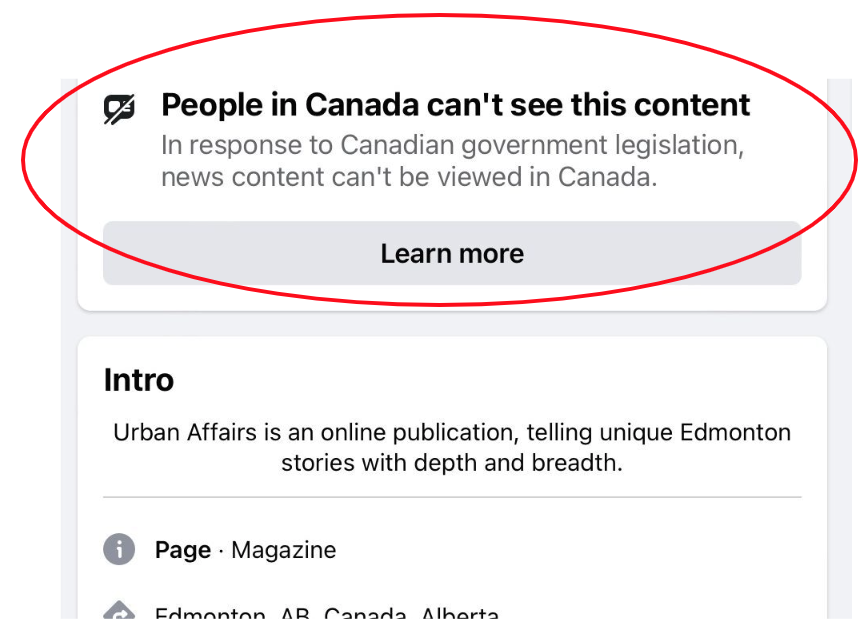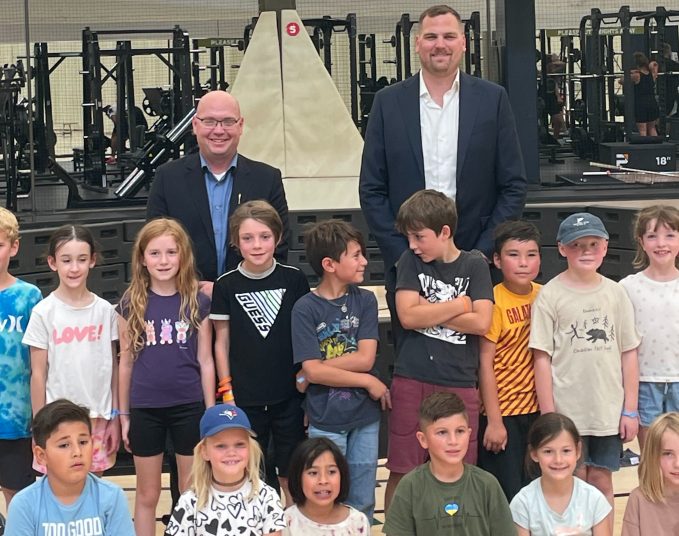We have been blocked.
It wasn’t a battle we asked for. But, like many independent, local media organizations across this country, we’ve become the collateral damage in a war between the federal government and the social media giants.
Chances are, if you’ve arrived at this post, it’s because you followed a link on X (we’re still alive, there), have subscribed to our Friday AF newsletter or are just a regular, loyal reader who reguarly checks back on Urban Affairs. However you got here, thank you. We value your support.
How did we get here? Here’s the take of an editor, author and copyright-protection evangelist. So, understand, I am all about creators’ rights.
For years, writers, illustrators and photographers, and the publishers who distribute their work, have seen their rights eroded. In Canada, first under Stephen Harper, and carried on by Justin Trudeau, the fair dealing clause in the Copyright Act created a lot of grey area in terms of how we get compensated when institutions copy and redistribute our work. Many school boards and universities across Canada have stopped paying licensing fees for the texts they use in schools. This matter has gone to the Supreme Court, and, for years, creators have lobbied the federal government to revisit the legislation. Many creators now only get a fraction of the rights payments compared to what they got a decade ago.
But, instead of bringing in real change that could benefit writers and publishers as a whole, the federal government decided to go after the most low-hanging fruit of low-hanging fruit — the social-media giants. Bill C-18 requires the media giants to compensate media organizations for the links that are on their websites that are shared by Canadians. The argument is that, in the modern world, social-media sites have become our de facto news organizations. And, you know what? That’s true. We often turn to social media to help us in our search for information, no matter the disinformation and hate speech we find along the way. For independent publishers, Meta and X and Google are strange bedfellows; yet, they exploit our work — but we need them. Their platforms are what we use to keep our readers informed about our latest stories. They are often the first lines of communication between the editors and readers. So, while we can all agree that social media sites have been bad actors and that, yes, maybe there is a way to compensate creators for their work that becomes viral on Facebook or Instagram or X, Bill C-18 is a great example of using a thermonuclear weapon to kill a fly.
Before going ahead with this ridiculous legislation, the Liberal government never spoke to small publishers like us. We would have told them that we depend on social media so we can attract readers, subscribers and, yes, advertisers and sponsors.
Sure, it’s frustrating that Meta has blocked us from posting our stories. But, we’re not naive. It’s not a service meant for the public good. When we go on Facebook or X we are entering into agreements with privately-held businesses. They owe us nothing. To think anything else is naive. In fact, I wonder, if I was a mega-billionaire that owned a large social-media site, would I have reacted any differently? We were granted licence by a private company — a company that isn’t headquartered in Canada, by the way — to post our material there. Now, said site’s management is pissed off, and it can do whatever it wants. If Mark Zuckerberg wanted to change the background colour of Facebook to purple, he could. And we need to understand that.
If Elon Musk wanted to turn his social-media investment into a vanity project… wait.
The problem is our federal government didn’t get that. It thought that legislating, instead of asking harder questions about copyright and the future of media, was the answer. It’s not.
How media is changed, and how the public consumes words, music and pictures is causing agony for both creators and those who distribute their work. Streaming of music and movies is changing the game. The Internet changed the way we read. And, if you wanted to boil the current writers’ and actors’ strikes in Hollywood down to a nutshell, it’s this — creators are claiming their reductions in royalty payments are directly tied to how little they get from streaming services like Amazon Prime, Apple TV or Netflix. Those services are nowhere near profitable, and offer viewers a world of choices for less than $20 a month. Is this a sustainable business practice, at all? (I hate the word content. Content basically suggests you will put any old crap out there in order to fill space. The term “content creator” is for charlatans and hobbyists. At best, “content” is a word that signifies nothing.)
Basically, we need to have deeper conversations about how little we pay for our information and art. We need to talk about how we can sustain journalism (and filmmaking, and recorded music, and the list goes on). But that conversation doesn’t begin by taking a legislative sledgehammer to our necessary evils — the social media giants.
In the meantime, we’ll lick our wounds and do the best we can. Support us by subscribing to our newsletter, if you haven’t already. Thanks for getting through this rant. We just care about this stuff so damn much.
Savvy AF. Blunt AF. Edmonton AF.




